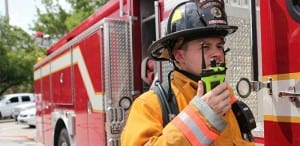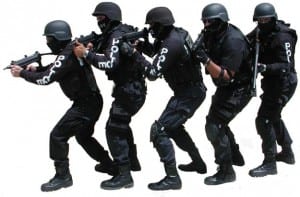 I was invited to be an observer at a regional police tactical training exercise. The program was a multi-day event, starting with some classroom training and culminating in a series of simulations using mock weapons, flash-bangs and actors. The one thing that readily stood out to me was the tactical teams were not using radios to communicate.[tweet this]
I was invited to be an observer at a regional police tactical training exercise. The program was a multi-day event, starting with some classroom training and culminating in a series of simulations using mock weapons, flash-bangs and actors. The one thing that readily stood out to me was the tactical teams were not using radios to communicate.[tweet this]
I asked the training coordinator why the teams were not using radios and was told the radios from the many different agencies represented were not compatible and they didn’t have enough radios for the teams to be properly equipped so they decided to run the exercises without radios.
 The lack of coordination and challenges with communications were readily apparent and it definitely impacted the situational awareness of teams who were observed engaging in independent action, unaware of the activities of other teams. At one point, a flash bang device was deployed and detonated dangerously close to a member of another team. It was definitely a near-miss event by all calculations.
The lack of coordination and challenges with communications were readily apparent and it definitely impacted the situational awareness of teams who were observed engaging in independent action, unaware of the activities of other teams. At one point, a flash bang device was deployed and detonated dangerously close to a member of another team. It was definitely a near-miss event by all calculations.
After the training was completed I had the opportunity to have a brief discussion with the coordinator and asked what contributes to the greatest challenges to tactical teams at real events. [tweet this] The answer was “communications.” Interestingly, there were no training sessions at this symposium dedicated to the topic of communications – the self-admitted leading challenge to team success.
Chief Gasaway’s Advice
 First responder teams would find great benefit in having a discussion about what causes the greatest challenges to success and what factors routinely contribute to safety concerns. Then, once identified, set a plan into action to fix the problem. Admittedly, training on radio communications is not nearly as exciting as donning gear, throwing flash bangs, kicking doors and taking down bad guys at gun point. But when it comes to improving team coordination, safety and situational awareness, it may be one of the most important skills a first responder can possess. Practice effective communications to improve safety.[tweet this]
First responder teams would find great benefit in having a discussion about what causes the greatest challenges to success and what factors routinely contribute to safety concerns. Then, once identified, set a plan into action to fix the problem. Admittedly, training on radio communications is not nearly as exciting as donning gear, throwing flash bangs, kicking doors and taking down bad guys at gun point. But when it comes to improving team coordination, safety and situational awareness, it may be one of the most important skills a first responder can possess. Practice effective communications to improve safety.[tweet this]
Interestingly, when responders practice high-stress scenarios without radios, they are at risk of not using the radios properly (or at all) during real scenarios because of their failure to use them in practice. Remember: Practices does not make perfect. Practice makes permanent.[tweet this]
Action Items
 1. How often does your organization building radio training into tactical evolutions?
1. How often does your organization building radio training into tactical evolutions?
2. Does your organization teach members how to effectively talk on the radio during high-stress, high-consequence events?
3. Do you have a standard operating guideline about how to talk on the radio and how to determine what information is essential radio traffic (i.e., how to manage the “noise” on the radio?
4. What best practices are you aware of about how to effectively communicate on the radio?
___________________________________________________________
The mission of Situational Awareness Matters is simple: Help first responders see the bad things coming… in time to change the outcome.
Safety begins with SA!
_____________________________________________________________
Share your comments on this article in the “Leave a Reply” box below. If you want to send me incident pictures, videos or have an idea you’d like me to research and write about, contact me. I really enjoy getting feedback and supportive messages from fellow first responders. It gives me the energy to work harder for you.
Thanks,

Email: Support@RichGasaway.com
Phone: 612-548-4424
Facebook Fan Page: www.facebook.com/SAMatters
Twitter: @SAMatters
LinkedIn: Rich Gasaway
YouTube: SAMattersTV
iTunes: SAMatters Radio

